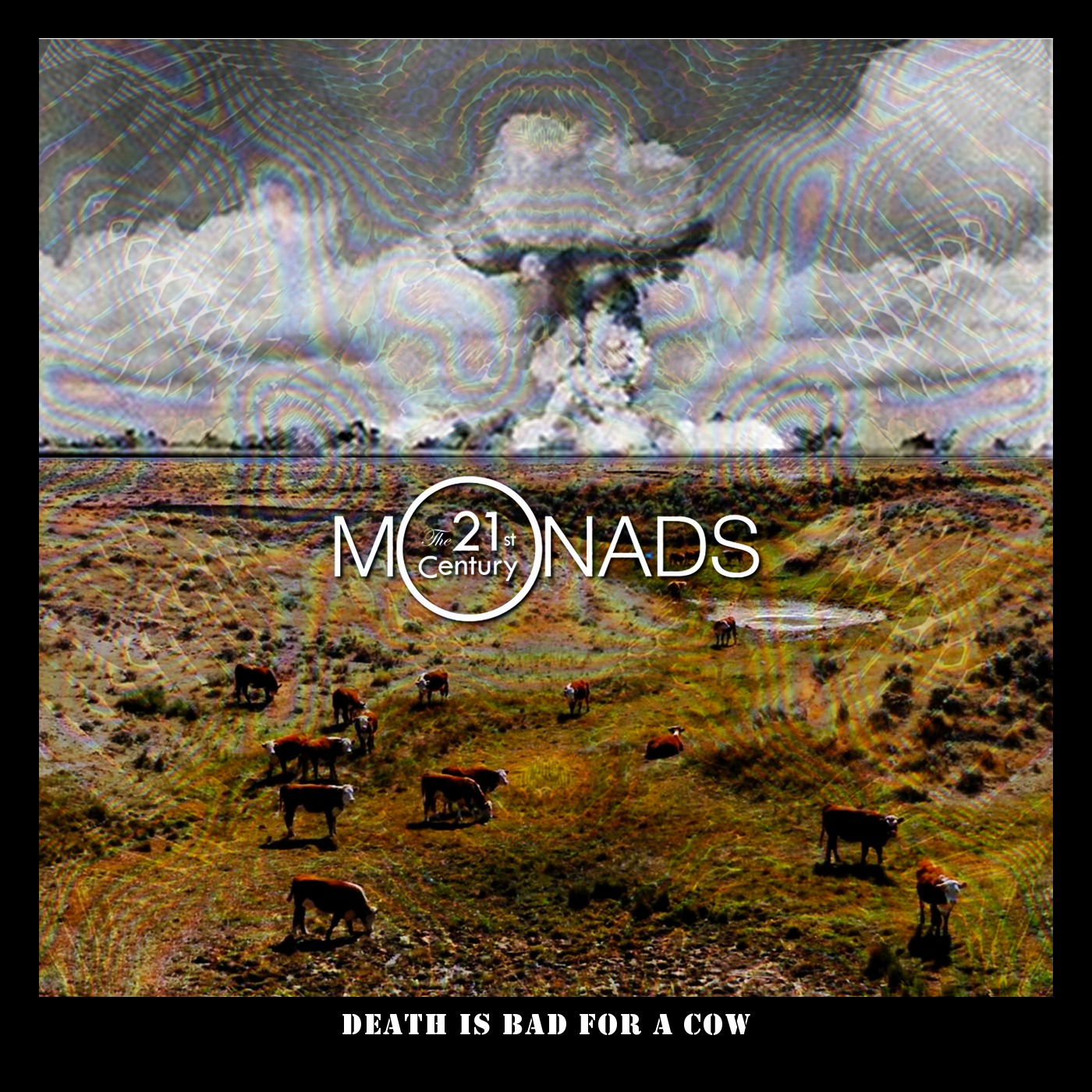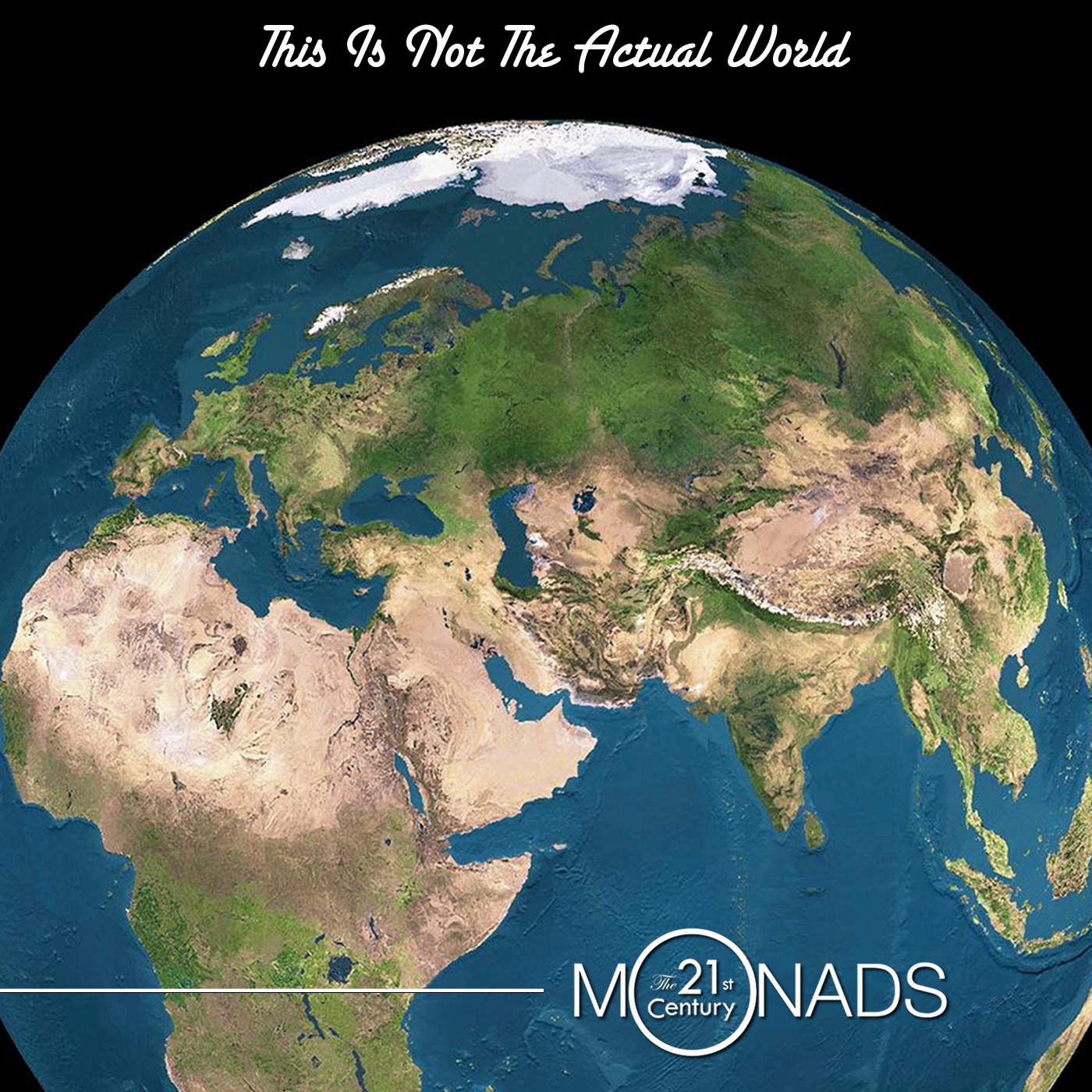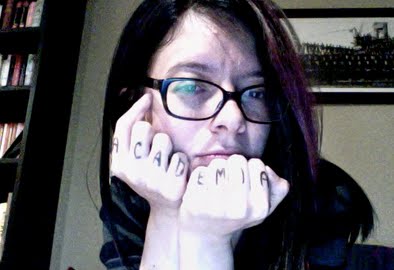What follows is an interview of artist and philosopher Carrie Ichikawa Jenkins. Carrie is the Canada Research Chair & Associate Professor in Philosophy at University of British Columbia and the Quarter-Time Chair in Theoretical Philosophy and Professorial Fellow at the Northern Institute of Philosophy, University of Aberdeen. She has published over two dozen journal articles and book chapters on issues in epistemology, metaphysics, logic, philosophy of language, and philosophy of mathematics, and is the author of the 2008 book Grounding Concepts: An Empirical Basis for Arithmetical Knowledge(Oxford).
As if this weren’t enough, Carrie also happens to be a talented vocalist, multi-instrumentalist, and member of the musical group 21st Century Monads (website here) along with Syracuse philosophers Ben Bradley, Kris McDaniel, and Hille Paakkunainen. Most of The 21st Century Monads songs are about philosophy in some form or other—e.g., broad philosophical themes (“Death is Bad for a Cow”), philosophical positions (“There Ain’t No Gunk”), the profession of Philosophy (“My Paper Was Rejected Again”), and even philosophers themselves (“Willard van Orman Quine”)—and range from quite clever and funny (“Utilitarian Girlfriend” & “I Ain’t Satisficing”) to touching and poignant (“When Does Composition Occur?” & “The Final Song”). It is an absolute pleasure to feature Carrie as Aesthetics for Birds’ inaugural Philosopher-Artist Interview.
Music composition and songcraft seem to require both a certain technical proficiency as well as creative aptitude. In a sense, so too does philosophy (or at least doing philosophy well). In your experience, how does songwriting or music composition compare to doing philosophy?
Interesting! In the case of songwriting, the technical aspects generally feel very backgrounded for me. Maybe that’s partly because I learned most of the music theory and instrumental skills I now have (such as they are) pretty early in my life. But it’s probably also got a lot to do with my preference for improvisation and play over any kind of serious or intensive musical skill development. My philosophical training happened much later, and I continue to work at acquiring new philosophical proficiencies alongside playing around with the ones I have. So that side of things feels pretty different for me.
Creativity-wise, maybe there are more similarities. I can’t really write songs without sitting down with my piano/guitar and pretty much just singing them until they exist. And writing a paper feels like that. I don’t really feel I’ve really put an argument together until it’s written out, at least in the form of a full draft, and I can’t really feel I’ve written a song until I’m playing it all the way through, and ideally at least a rough demo exists. My memory is terrible, which might explain my need to get everything down before I feel like it’s real.
Given that you’ve co-authored a few philosophy papers before, how does your experience in co-authoring a philosophy paper compare to that of co-authoring a song?
I’m cagey about creative collaboration, and it’s a rare thing for me to be able to do it. Being able to share early drafts or demos (no matter how dire) without feeling like a total numbat is the main psychological hurdle I have to jump. With Kris this is facilitated by the knowledge my hard drive is full of equally blackmail-worthy outtakes by him. I suppose we have achieved a comfortable state of mutually assured destruction.
Co-authorship of philosophy for me feels pretty different in this respect. The shameless exposition of philosophical ideas (however half-baked and bizarre) to pretty much anyone who’s semi-willing to listen has been totally normalized for me, ever since I started doing philosophy. And I see all the time how crucial it is for turning half-baked ideas into baked ideas.
But with regard to the actual process, I find co-writing songs easier than co-writing papers. With papers there is a lot to navigate: if all authors want to agree with all the statements in the paper, it can be hard to find formulations that work. Even if that’s not a requirement, it takes a lot of discussion to figure out the best compromises. Draft-reading has to be done by each author instead of just one. In general, I think single-authoring is a considerably easier task (which of course is not to say, especially in my own case, that it produces better results).
Co-writing songs, for me, doesn’t raise the same issues about agreement. The kind of thing that might happen is that Kris might send me a first verse in search of a couple more, and then I think some up and send them back to him, and then usually we’re good to go. Or I might put together a demo with a vocal take and a single instrument track and send it to Kris, at which point he and Hille and Ben will work on all the other vocal and instrumental parts, and then again we’ll be good to go. It feels much more like splitting the job than co-authoring philosophy does; the latter for me usually feels more like everyone doing all the job and then everyone doing some extra things as well. I should mention Kris does all the mixing for our songs, which is a huge and highly skilled task. Kris is awesome BTW.

Do you think it’s fair to characterize 21st Century Monads as a group of professional philosophers writing and performing songs about professional philosophy aimed largely if not exclusively at an audience of professional philosophers?
Well, family members are also obligated to express admiration.
Similarly, to what extent, if any, do you think properly engaging with or fully appreciating the music of The 21st Century Monads requires having an extensive background knowledge of (contemporary Anglo-American) philosophy?
Someone once told me that listening to a Monads song without that kind of background felt like overhearing part of a conversation and not being sure if it was meant for them or not. I think responses by non-philosophers such as this one can be pretty intriguing, though I guess it’s much rarer for a non-philosopher to feel like they have a reason to listen in the first place. I do have the impression that a number of people who aren’t professional philosophers but have philosophical training or interests follow the band online and engage with the songs. But it’s surely true that the majority of our audience has at least fairly extensive philosophical training and experience of professional philosophy.
I (genuinely, philosophically) wonder what counts as properly engaging or fully appreciating. Many of the songs contain technical vocab, terrible puns and unrelenting strings of in-jokes that wouldn’t mean anything without background knowledge. And a lot of what I myself value about the songs concerns the possibility of making people laugh at and/or with philosophy and philosophers. But several of the songs also have messages that can be read off without any particular background (e.g. The Final Song, I Can’t Stop Buying Books) and some can work on more than one level (e.g. I’m Your Shadow, You Are The One).
To be honest, I’m no Heidegger scholar and when I sang ‘The Nothing Noths’ (written by Kris), I thought it sounded awesome but I had pretty much no idea what I was talking about. It reminded me of Carrie Fisher once saying something similar about some of the lines she had to say in the Star Wars movies.
Have you ever received criticisms about the philosophical content of a 21st Century Monads song (e.g., that it uncharitably depicts or outright misrepresents such-and-such philosophical position)? To what extent, if at all, might you think such criticisms to be aesthetically/artistically relevant?
The only such incident I can think of came from a commentator on a blog on the internet, who if I remember rightly found the critique of experimental philosophy in the song A Priori (‘Don’t need no fucking survey’) insufficiently nuanced. Aesthetically speaking, I couldn’t help feeling the point must have been missed by at least one of us.

Do you consider the songs of 21st Century Monads to be artworks? Does their being artworks in fact matter to you, either philosophically or personally?
Rebecca West once said that ‘[a]ny authentic work of art must start an argument between the artist and their audience’. Say what you like about philosophers, they are pretty good at starting an argument. I can believe that our songs cover the right kinds of topics, and expound enough controversial views, to start some interesting ones. Some colleagues use them as prompts for teaching classes, which we think is very cool. But unfortunately West didn’t (so far as I know) adduce any sufficient condition, so I’m not sure that’s enough. I have actually been spending a chunk of my spare time trying to figure out what art is for about a year now (true story). Does it matter to me whether the songs are artworks? Less than it matters whether they kick ass at being whatever they are.
A predominant view in the ontology of music is that musical works (at least those of pure or absolute music) are unstructured universals and so individuated purely in terms of their sonic properties such that perfect sound-alikes are identical (Dodd 2007, 2010, 2012). Metaphysically speaking, what sort of thing do you consider your songs to be (whether purely instrumental or with lyrical content): material objects, physical (sound) events, abstract types, universals, sets or mereological sums of thereof, etc.)?
Argh; you realise this question is really hard compared to the others, right?
If I have to plump for something, I’ll go with their being abstract types that are individuated partly by the band’s intentions qua creators, and partly by the sound types and word types involved and the arrangement thereof. I think they’re much more structured than mere sets of sounds and/or words, and have various other features that sets don’t have. I’ll add that multiple concrete tokens of each song can exist, and that the songs themselves are created and hence temporally (though not spatially) located. They have causal powers.
The new 21st Century Monads album, Interlocutor, will be released this fall. The first single comes out on September 4th. Find the 21st Century Monads on Facebook or follow @21stcentmonads on Twitter for more info.



August 30, 2013 at 6:29 pm
Great interview!
\begin{self-serving pedantry}
I consider it a grave oversight that “historical individual” isn't one of the options listed in the final question. That's the answer I plump for in print, and it also seems to fit the parameters outlined in Carrie's answer: being like a historically constrained type, having a temporal origin, having causal power, etc.
\end{self-serving pedantry}
August 31, 2013 at 4:26 am
I like your music.
September 6, 2013 at 12:14 am
RE: criticisms of the philosophical content — I googled death is bad for a cow and this was the first hit https://www.youtube.com/watch?v=PvvbwaeiB9E&list=HL1378425712 (“Ha ha! But that is not an argument, that is dogmatic assertion”). Fighting words!
September 6, 2013 at 1:10 am
I am very happy to see series of interviews (in general), and this interview (in particular). Awesome sauce!
About the last question, I'm now wondering about how to classify covers. (Why yes, I think I will go read the blog author's paper on this very topic. What a good reminder.) I'm also curious about the identity conditions of bands. Are the 21st-Century Monads the same band as the Monads, just with different members? Is it possible for the 21st-Century Monads to cover a Monads song?
And I am so looking forward to the upcoming poetry discussions.
September 6, 2013 at 1:59 am
As to the identity conditions for bands (if not in most matters be they philosophical or otherwise), I think Mark E. Smith of The Fall has the best position. When asked about this very issue given the Fall's ever changing line-up (over 50 members since 1976 many of whom were booted out or quit after only a few months) only, Mark famously replied, “If it's me and your granny on bongos, then it's the Fall.”
September 24, 2013 at 1:01 am
I believe Kris's position on the Monads and the 21st Century Monads is (or at least used to be) that they are indeterminately identical.
September 24, 2013 at 3:04 am
In this context, maybe worth mentioning that Carrie actually did cover some Monads tunes before joining the 21st Century Monads. -Kris